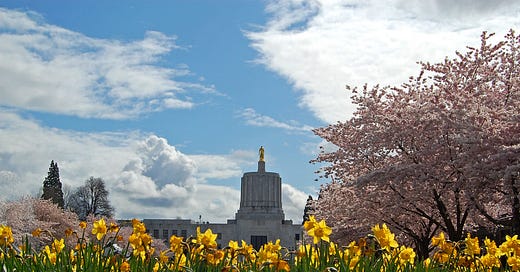Eric K. Ward: A BIPOC Vision for Oregon That Benefits Everyone
I encourage everyone to check out the 2021 BIPOC Caucus Legislative Agenda and ask, "Who wouldn’t be helped by these changes?"
Eric K. Ward, Executive Director of Western States Center, Senior Fellow of the Southern Poverty Law Center, Senior Advisor to Race Forward. @BulldogShadow

After decades in which Oregon’s 90-person legislature was all white, or nearly so with only one or two legislators of color at any given time, the 12-person 2021 Black, Indigenous & People of Color (BIPOC) Caucus is good news for the Oregon Way.
For members of BIPOC communities, representation matters. For many of these legislators and their communities, their office-holding is historic. Rep. Tawna Sanchez, of Shoshone, Bannock, and Ute descent, is only the second Native American to serve in the Oregon legislature, and the first to represent Portland. Senator Kayse Jama is the first Muslim ever to serve in the Oregon Senate, and currently the only refugee holding legislative office. My State Representative, Khanh Pham, is Oregon’s first Vietnamese-American legislator and the first of Asian descent to represent East Portland’s Jade District.
I expect I could name “firsts” for each of the other members of the BIPOC Caucus. But my point is that their presence in the legislature is not just good news for their communities that have gone so long without seeing someone who looked like them in the halls of power; it’s good news for all Oregonians.
Oregon continues to suffer from stale narratives about the urban-rural divide and the myth of scarcity that alleges that gains for any one group must represent losses to another. White nationalists take this one step further by arguing that long overdue equity for BIPOC members of our community represents a direct threat to a waning white majority.
The truth is none of us can truly thrive long term at the expense of others. I’ve long argued that the struggles that unite us are far greater than the narratives that divide us.
The composition and priorities of the 2021 Oregon Legislative BIPOC Caucus move us in the direction of an Oregon Way in which we see our fates as intertwined, and our communities as broader than “urban” or “rural.” The districts that elected or appointed these legislators span parts of cities, suburbs, farm and forest lands. Where many might once have pictured only Northeast Portland when meeting a Black legislator, today that legislator could represent the “country” communities of Junction City or Boring, Oregon.
More importantly, the 2021 BIPOC Caucus Legislative Agenda is full of changes that all of Oregon needs in order to prosper. An Oregon “where everyone has an equal opportunity to thrive” is at the heart of the BIPOC Caucus vision. That means an Oregon “that is diverse, dynamic, just and equitable; where our communities are self-sufficient and have full agency to meet our needs and afford the basics and more; where oppression and racial disparities are non-existent and everyone lives full lives; and where distributed and collective power is also a form of leadership.”
Is there anyone in Oregon who would not benefit from this vision? Anyone that would be harmed by this aspiration becoming our collective reality?
What Oregon’s BIPOC Legislative Caucus has articulated is more than a vision. It’s a list of values—values that are inseparable from what I see us striving towards as The Oregon Way.
Let’s look at a couple of examples.

One aim of the package is passing police accountability and criminal justice reform bills. According to Senator Lew Frederick, these bills aim “to restore confidence of the work of police officers across Oregon.” Having Portland’s Police Bureau ranked the fifth worst in the nation for racial disparities (arresting Black people at 4.3 times the rate of white people and killing Black people 3.9 times more than white people) harms all of Oregon.
When police officers and other law enforcement are not trusted, all of our communities are at greater risk. Tourism and convention business suffers. And other public services are harmed by the millions of dollars cities and counties have to pay out in legal settlements resulting from police misconduct.
Economic relief measures introduced by the BIPOC Caucus also create a clear bridge across perceived divides.
HB 2839, for example, is being carried by my Northeast Portland Representative Khanh Pham and Southern Oregon’s Senator Jeff Golden. The bill, if passed, will benefit every low- and middle-income Oregonian by disconnecting the state from Federal CARES Act tax breaks which overwhelmingly benefit wealthy Oregonians at a time when we need to protect General Fund dollars for needed social safety net programs.
Similarly, Rep. Pham’s HB 2475 authorizing discount utility rates for low-income households will bring relief to hard-hit residents in every community; it’s backed by a cosponsor coalition hailing from Redmond, Hood River, Linn, Lane, Clackamas, and Multnomah counties.
Finally, a pro-democracy bill, HB 2679, championed by Representative Ricki Ruiz has two-dozen cosponsors from all over the state. Farming communities, and others where young people assume adult responsibilities early in life, can particularly appreciate this reform, which permits those who are 17 years old on the date of a primary election and 18 by the general election to vote in a primary.
I encourage everyone to check out the 2021 BIPOC Caucus Legislative Agenda and ask, Who wouldn’t be helped by these changes? And, more importantly, How can I help this version of the Oregon Way become a reality?
**************************************
Send feedback to Eric:
@BulldogShadow
Keep the conversation going:
Facebook (facebook.com/oregonway)
Twitter (@the_oregon_way)
Check out our podcast:



